-
 Bitcoin
Bitcoin $87,772.6996
0.99% -
 Ethereum
Ethereum $1,570.5330
-2.49% -
 Tether USDt
Tether USDt $1.0000
0.01% -
 XRP
XRP $2.0836
-1.10% -
 BNB
BNB $599.1765
0.07% -
 Solana
Solana $138.0201
-2.11% -
 USDC
USDC $0.9999
0.01% -
 Dogecoin
Dogecoin $0.1599
0.63% -
 TRON
TRON $0.2467
0.31% -
 Cardano
Cardano $0.6233
-1.67% -
 Chainlink
Chainlink $13.1154
-2.78% -
 UNUS SED LEO
UNUS SED LEO $9.1017
-1.66% -
 Avalanche
Avalanche $19.7493
-1.09% -
 Stellar
Stellar $0.2496
0.02% -
 Toncoin
Toncoin $2.9084
-3.65% -
 Shiba Inu
Shiba Inu $0.0...01230
-2.09% -
 Sui
Sui $2.2248
2.27% -
 Hedera
Hedera $0.1694
-0.70% -
 Bitcoin Cash
Bitcoin Cash $342.3982
0.49% -
 Hyperliquid
Hyperliquid $18.1794
-0.12% -
 Litecoin
Litecoin $78.6773
-0.19% -
 Polkadot
Polkadot $3.7586
-4.30% -
 Dai
Dai $0.9998
-0.02% -
 Bitget Token
Bitget Token $4.4381
-1.01% -
 Ethena USDe
Ethena USDe $0.9992
0.01% -
 Pi
Pi $0.6309
-1.94% -
 Monero
Monero $214.9808
-0.07% -
 Uniswap
Uniswap $5.2523
-2.33% -
 Pepe
Pepe $0.0...07838
1.42% -
 OKB
OKB $50.7171
-0.70%
Do Bitcoin payment platforms require KYC (identity verification)? How is the privacy?
Bitcoin payment platforms vary in KYC requirements; strict platforms like Coinbase ensure security but compromise privacy, while LocalBitcoins and Bisq offer anonymity with higher fraud risks.
Apr 19, 2025 at 10:36 pm
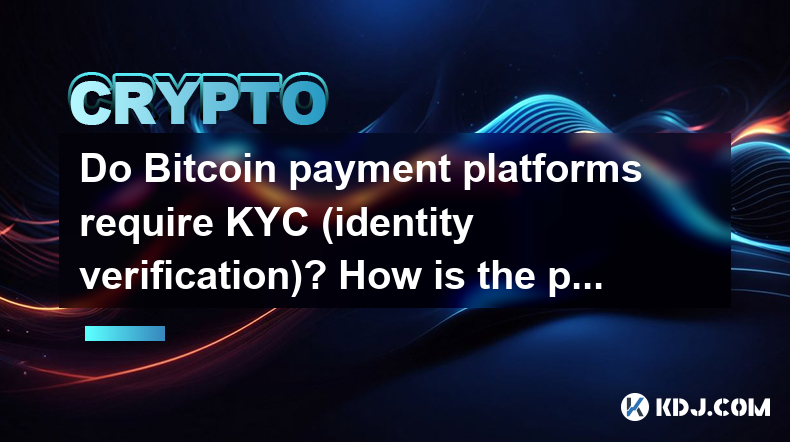
Bitcoin payment platforms have become increasingly popular as the cryptocurrency market continues to grow. One of the critical concerns for users is whether these platforms require KYC (Know Your Customer) procedures and how this impacts user privacy. In this article, we will delve into the specifics of KYC requirements across various Bitcoin payment platforms and examine the privacy implications for users.
Understanding KYC in Bitcoin Payment Platforms
KYC, or Know Your Customer, is a process used by businesses to verify the identity of their clients. In the context of Bitcoin payment platforms, KYC is implemented to comply with regulatory requirements and to prevent fraud, money laundering, and other illicit activities. The extent to which KYC is required can vary significantly between different platforms.
Some Bitcoin payment platforms strictly adhere to KYC protocols, requiring users to submit personal identification documents such as passports, driver's licenses, or utility bills. These platforms typically operate in regions with stringent regulatory environments, where financial institutions are mandated to perform thorough identity checks. Examples of such platforms include Coinbase and Binance, which require users to complete a detailed verification process before they can buy, sell, or trade cryptocurrencies.
On the other hand, there are platforms that offer more relaxed or no KYC requirements. These platforms often cater to users who prioritize privacy and anonymity. LocalBitcoins and Bisq are examples of peer-to-peer (P2P) platforms where users can trade Bitcoin with minimal or no identity verification. However, the trade-off is that these platforms may have lower liquidity and might not support as many payment methods as their KYC-compliant counterparts.
Privacy Implications of KYC on Bitcoin Payment Platforms
The implementation of KYC on Bitcoin payment platforms has significant implications for user privacy. When users submit their personal information for verification, this data is stored by the platform, which can potentially be accessed by third parties, including government agencies and hackers. This raises concerns about data security and privacy breaches.
Platforms that enforce strict KYC procedures often have robust security measures in place to protect user data. For instance, Coinbase uses encryption and multi-factor authentication to safeguard user information. However, no system is entirely foolproof, and there have been instances of data breaches on major platforms. The 2019 Binance hack, where hackers stole user data along with cryptocurrencies, is a notable example.
For users who prioritize privacy, platforms with minimal or no KYC requirements are more appealing. These platforms allow users to transact without revealing their identities, thereby maintaining a higher level of anonymity. However, users should be aware that while these platforms offer greater privacy, they may also be more susceptible to fraud and scams due to the lack of oversight.
Balancing KYC and Privacy: User Choices and Considerations
When choosing a Bitcoin payment platform, users must weigh the benefits of KYC compliance against their privacy concerns. Platforms that require KYC offer a higher level of security and regulatory compliance, which can be crucial for users who plan to engage in significant transactions or need to comply with legal requirements in their jurisdiction.
For those who value privacy above all else, platforms with minimal or no KYC requirements provide a viable alternative. However, users should take additional steps to protect their privacy, such as using virtual private networks (VPNs) and ensuring that their Bitcoin transactions are not linked to their real-world identities.
How to Use Bitcoin Payment Platforms with Minimal KYC
For users interested in using Bitcoin payment platforms with minimal KYC requirements, here are the steps to get started:
- Choose a Platform: Select a platform that aligns with your privacy needs. Popular choices include LocalBitcoins and Bisq.
- Download and Install: If the platform requires software, download and install it on your device. For example, Bisq requires you to download and set up the application.
- Create an Account: Register an account using an email address. Some platforms may not even require an email address for registration.
- Set Up Payment Methods: Add your preferred payment methods. These can range from bank transfers to cash deposits, depending on the platform and the seller you choose to trade with.
- Find a Trade: Browse available trades and select one that suits your needs. On LocalBitcoins, you can filter trades based on payment methods, location, and other criteria.
- Complete the Transaction: Follow the instructions provided by the seller to complete the payment. Once the payment is confirmed, the Bitcoin will be transferred to your wallet.
Case Studies: KYC and Privacy on Different Platforms
To illustrate the varying approaches to KYC and privacy, let's look at a few case studies:
Coinbase: As one of the largest and most regulated cryptocurrency exchanges, Coinbase requires users to complete a comprehensive KYC process. Users must provide their full name, date of birth, address, and a government-issued ID. This information is used to comply with anti-money laundering (AML) and know-your-customer (KYC) regulations. While this ensures a high level of security and compliance, it also means that user data is stored and potentially accessible to third parties.
LocalBitcoins: In contrast, LocalBitcoins operates as a P2P marketplace where users can trade Bitcoin directly with each other. The platform does not require KYC for most transactions, allowing users to maintain their anonymity. However, this also means that users must be cautious and perform their due diligence to avoid scams and fraudulent activities.
Bisq: Bisq is another P2P platform that emphasizes privacy and decentralization. It does not require any KYC, and users can trade Bitcoin using various payment methods without revealing their identities. However, the platform's liquidity may be lower compared to centralized exchanges, and users must be comfortable with a more complex user interface.
Navigating KYC and Privacy: Tips for Users
For users navigating the world of Bitcoin payment platforms, here are some tips to balance KYC requirements with privacy concerns:
- Research the Platform: Before signing up, research the platform's KYC policies and privacy practices. Look for reviews and user experiences to understand how the platform handles user data.
- Use Privacy Tools: Utilize tools such as VPNs and Tor to mask your IP address and enhance your online privacy. This can be particularly useful when using platforms with minimal KYC requirements.
- Understand the Risks: Be aware of the risks associated with platforms that do not require KYC. While they offer greater privacy, they may also be more vulnerable to fraud and scams.
- Secure Your Bitcoin: Use secure wallets and follow best practices for securing your Bitcoin. This includes using hardware wallets, enabling two-factor authentication, and regularly updating your software.
Frequently Asked Questions
Q: Can I use Bitcoin payment platforms without KYC if I live in a country with strict regulations?
A: It depends on the specific regulations in your country. Some jurisdictions have strict laws that require all financial transactions, including those involving cryptocurrencies, to comply with KYC and AML regulations. In such cases, using platforms without KYC might be illegal or risky. Always check local laws and regulations before using any Bitcoin payment platform.
Q: How can I protect my privacy when using Bitcoin payment platforms with KYC?
A: Even on platforms that require KYC, you can take steps to protect your privacy. Use strong, unique passwords for each platform, enable two-factor authentication, and consider using a separate email address for cryptocurrency-related activities. Additionally, regularly review the platform's privacy policy and be cautious about sharing more information than necessary.
Q: Are there any legal risks associated with using Bitcoin payment platforms without KYC?
A: Yes, there can be legal risks. In many countries, financial institutions are required to comply with KYC and AML regulations to prevent money laundering and other illegal activities. Using platforms that do not comply with these regulations could lead to legal repercussions, including fines or criminal charges. Always ensure you understand the legal implications in your jurisdiction before using such platforms.
Q: How do Bitcoin payment platforms with minimal KYC handle disputes and fraud?
A: Platforms with minimal or no KYC often rely on user feedback and reputation systems to manage disputes and fraud. For example, LocalBitcoins uses a rating system where users can review their trading partners. In case of a dispute, users can open a case with the platform's support team, which may act as a mediator. However, without the oversight provided by KYC, resolving disputes can be more challenging, and users must be more vigilant and cautious.
Disclaimer:info@kdj.com
The information provided is not trading advice. kdj.com does not assume any responsibility for any investments made based on the information provided in this article. Cryptocurrencies are highly volatile and it is highly recommended that you invest with caution after thorough research!
If you believe that the content used on this website infringes your copyright, please contact us immediately (info@kdj.com) and we will delete it promptly.
- The Next 100x Meme Coin Isn't Even Listed Yet: Trolling the Cat Market
- 2025-04-22 08:40:13
- Pepe Coin (PEPE) Price Prediction: Will the Memecoin Breakout?
- 2025-04-22 08:40:13
- SUI Could Rally 28%, AVAX Bulls Take Control—But Web3 ai's AI Tools Are Built to Outlast Them Both
- 2025-04-22 08:35:13
- Tron (TRX) Emerges as the Top Stablecoin Destination, Bringing in $623 Million
- 2025-04-22 08:35:13
- Apart from cryptocurrencies, NFTs are another popular market
- 2025-04-22 08:30:12
- Top 10 Trending Cryptos on DEXTools in April 2025
- 2025-04-22 08:30:12
Related knowledge
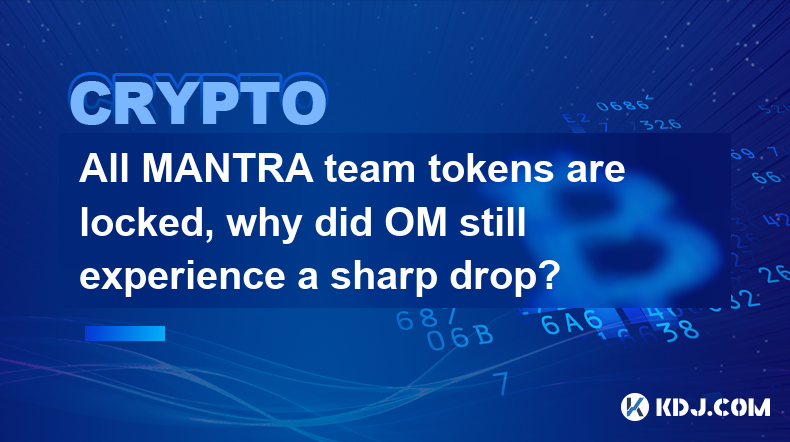
All MANTRA team tokens are locked, why did OM still experience a sharp drop?
Apr 20,2025 at 11:14am
Introduction to MANTRA and OM TokenThe MANTRA project is a blockchain platform that aims to provide a scalable and secure environment for decentralized applications (dApps). The native token of the MANTRA ecosystem is OM, which plays a crucial role in governance, staking, and other functionalities within the platform. Recently, the MANTRA team announced...
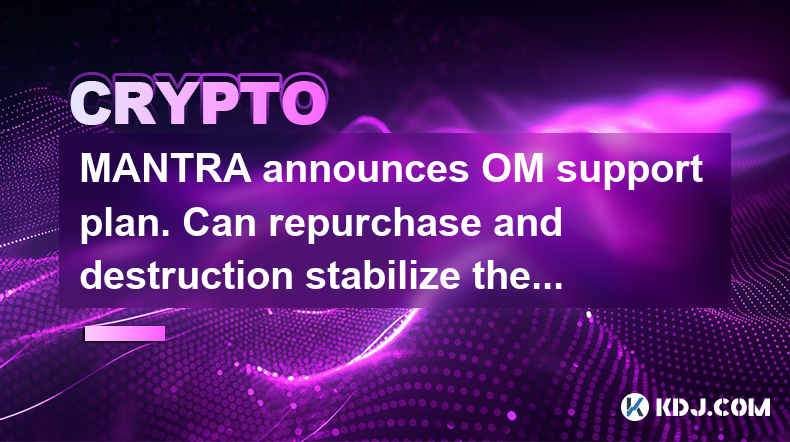
MANTRA announces OM support plan. Can repurchase and destruction stabilize the currency price?
Apr 21,2025 at 01:57pm
MANTRA, a notable player in the cryptocurrency ecosystem, has recently announced an OM support plan that includes mechanisms for repurchasing and destroying tokens. This move has sparked significant interest and discussion within the crypto community, particularly around its potential impact on the stability of the OM token's price. In this article, we ...
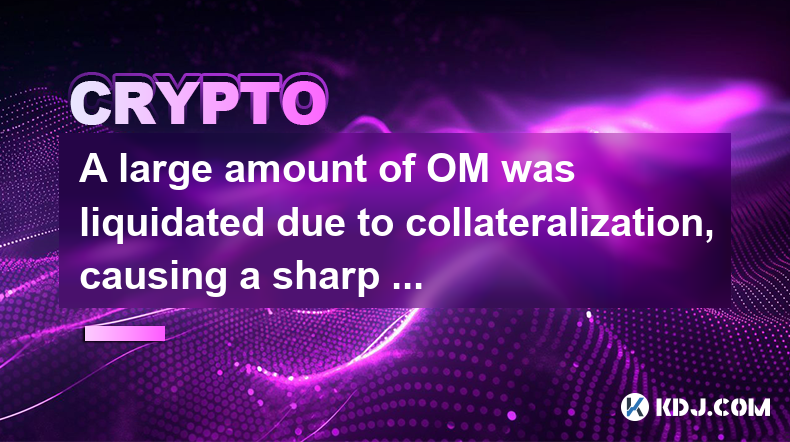
A large amount of OM was liquidated due to collateralization, causing a sharp drop? MANTRA analyzes the reasons for the market turmoil
Apr 21,2025 at 01:57am
The cryptocurrency market is known for its volatility, and sharp price movements can often be attributed to a variety of factors. Recently, a large amount of OM (Mantra DAO's native token) was liquidated due to collateralization issues, leading to significant market turmoil. In this article, MANTRA analyzes the reasons behind this event and the subseque...
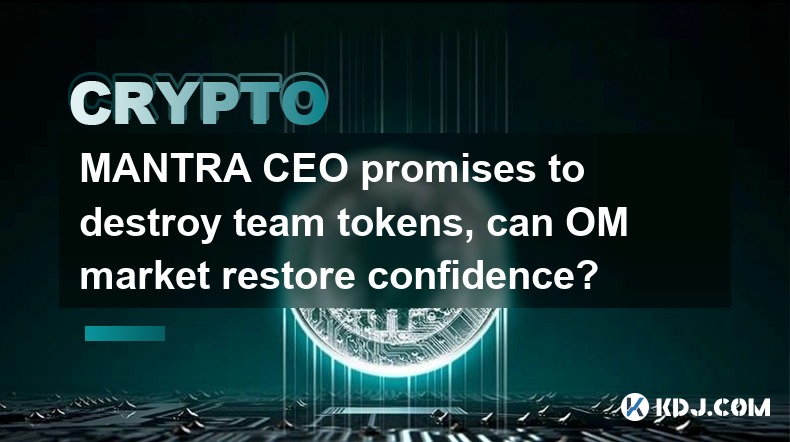
MANTRA CEO promises to destroy team tokens, can OM market restore confidence?
Apr 21,2025 at 08:28am
The recent announcement from the CEO of MANTRA about destroying team tokens has sparked a wave of discussions within the cryptocurrency community. This move is seen as a strategic effort to restore confidence in the OM market, which has been facing various challenges. The decision to burn team tokens is not just a simple action; it involves a series of ...
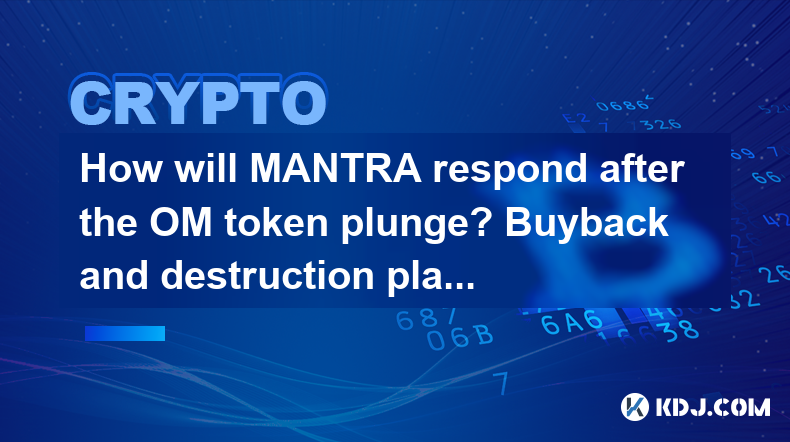
How will MANTRA respond after the OM token plunge? Buyback and destruction plan revealed
Apr 19,2025 at 11:42pm
The recent plunge in the OM token price has left many investors and enthusiasts of the MANTRA ecosystem concerned about the future stability and value of their holdings. In response to these market fluctuations, MANTRA has announced a comprehensive buyback and destruction plan aimed at restoring confidence and supporting the long-term health of the OM t...
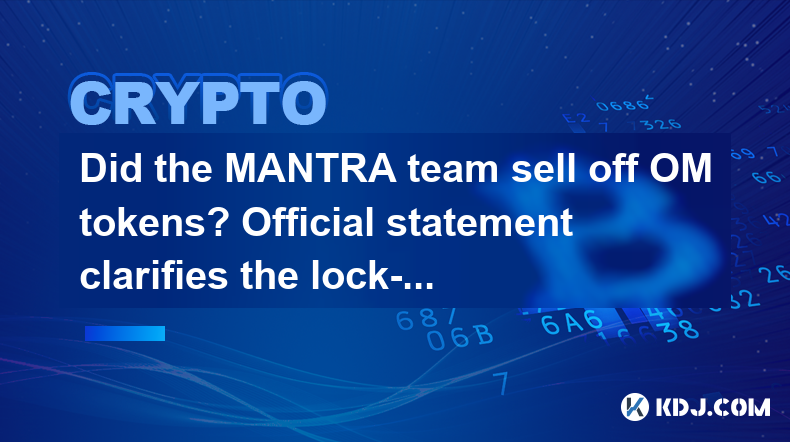
Did the MANTRA team sell off OM tokens? Official statement clarifies the lock-up situation
Apr 19,2025 at 10:56pm
The recent buzz around the MANTRA project and its native token, OM, has led to speculation and concerns within the cryptocurrency community about whether the MANTRA team has sold off their OM tokens. To address these concerns and clarify the situation, the MANTRA team has released an official statement detailing the lock-up situation of their tokens. Th...

All MANTRA team tokens are locked, why did OM still experience a sharp drop?
Apr 20,2025 at 11:14am
Introduction to MANTRA and OM TokenThe MANTRA project is a blockchain platform that aims to provide a scalable and secure environment for decentralized applications (dApps). The native token of the MANTRA ecosystem is OM, which plays a crucial role in governance, staking, and other functionalities within the platform. Recently, the MANTRA team announced...

MANTRA announces OM support plan. Can repurchase and destruction stabilize the currency price?
Apr 21,2025 at 01:57pm
MANTRA, a notable player in the cryptocurrency ecosystem, has recently announced an OM support plan that includes mechanisms for repurchasing and destroying tokens. This move has sparked significant interest and discussion within the crypto community, particularly around its potential impact on the stability of the OM token's price. In this article, we ...

A large amount of OM was liquidated due to collateralization, causing a sharp drop? MANTRA analyzes the reasons for the market turmoil
Apr 21,2025 at 01:57am
The cryptocurrency market is known for its volatility, and sharp price movements can often be attributed to a variety of factors. Recently, a large amount of OM (Mantra DAO's native token) was liquidated due to collateralization issues, leading to significant market turmoil. In this article, MANTRA analyzes the reasons behind this event and the subseque...

MANTRA CEO promises to destroy team tokens, can OM market restore confidence?
Apr 21,2025 at 08:28am
The recent announcement from the CEO of MANTRA about destroying team tokens has sparked a wave of discussions within the cryptocurrency community. This move is seen as a strategic effort to restore confidence in the OM market, which has been facing various challenges. The decision to burn team tokens is not just a simple action; it involves a series of ...

How will MANTRA respond after the OM token plunge? Buyback and destruction plan revealed
Apr 19,2025 at 11:42pm
The recent plunge in the OM token price has left many investors and enthusiasts of the MANTRA ecosystem concerned about the future stability and value of their holdings. In response to these market fluctuations, MANTRA has announced a comprehensive buyback and destruction plan aimed at restoring confidence and supporting the long-term health of the OM t...

Did the MANTRA team sell off OM tokens? Official statement clarifies the lock-up situation
Apr 19,2025 at 10:56pm
The recent buzz around the MANTRA project and its native token, OM, has led to speculation and concerns within the cryptocurrency community about whether the MANTRA team has sold off their OM tokens. To address these concerns and clarify the situation, the MANTRA team has released an official statement detailing the lock-up situation of their tokens. Th...
See all articles






















































































